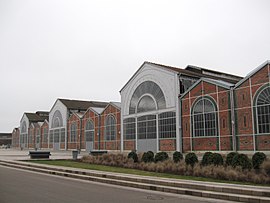Vierzon
| Vierzon | ||
|---|---|---|

Factory of the Société Française
|
||
|
||
| Coordinates: 47°13′21″N 2°04′10″E / 47.2225°N 2.0694°ECoordinates: 47°13′21″N 2°04′10″E / 47.2225°N 2.0694°E | ||
| Country | France | |
| Region | Centre-Val de Loire | |
| Department | Cher | |
| Arrondissement | Vierzon | |
| Canton | Vierzon-1 and Vierzon-2 | |
| Intercommunality | Vierzon Pays des cinq Rivières | |
| Government | ||
| • Mayor (2008–2014) | Nicolas Sansu | |
| Area1 | 74.5 km2 (28.8 sq mi) | |
| Population (2012)2 | 39,715 | |
| • Density | 530/km2 (1,400/sq mi) | |
| Time zone | CET (UTC+1) | |
| • Summer (DST) | CEST (UTC+2) | |
| INSEE/Postal code | 18279 / 18100 | |
| Elevation | 94–182 m (308–597 ft) (avg. 102 m or 335 ft) |
|
|
1 French Land Register data, which excludes lakes, ponds, glaciers > 1 km² (0.386 sq mi or 247 acres) and river estuaries. 2Population without double counting: residents of multiple communes (e.g., students and military personnel) only counted once. |
||
1 French Land Register data, which excludes lakes, ponds, glaciers > 1 km² (0.386 sq mi or 247 acres) and river estuaries.
Vierzon (French pronunciation: [vjɛʁ.zɔ̃]) is a commune in the Cher department in the Centre region of France.
A medium-sized town by the banks of the Cher River with some light industry and an area of forestry and farming to the north. It is situated some 33 kilometres (21 miles) northwest of Bourges, at the junction of the D2020, D2076 and the D918 roads.
Motorways encircle the town on three sides: the A85 and A71 on the north and east and the A20 on the north and west. Railways reached Vierzon in 1847 and a central SNCF hub, serving local and nation rail traffic, has been developed here ever since.
Little evidence remains of any pre-Roman occupation, and the Romans themselves didn’t leave much trace of their occupation. Not until 926, when a Benedictine monastery was built (on the site of the current Town Hall) are there any records. The monks came from the abbey of Deuvre, at Saint-Georges-sur-la-Prée, after the abbey was sacked by the Normans in 903. They brought with them the relics of St. Perpetua. These relics were again transferred to the church of Notre-Dame de Vierzon in 1807, where they remain today.
Also in the 10th century, the Normans built a castle atop a feudal motte. They became the seigneurs of Vierzon and the city developed within the western ramparts of the castle.
...
Wikipedia



